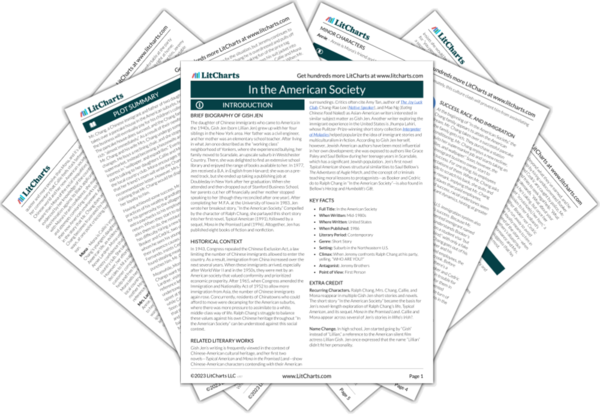In “In the American Society,” the Chang family contends with two opposing forces: the drive to assimilate into American life and the impulse to respect Chinese customs. Ralph Chang, a Chinese immigrant (and the narrator Callie’s father), takes over a pancake shop in hopes of saving money for his daughters’ college educations. His business quickly succeeds, and the Changs become wealthy. Before long, however, tensions arise between Mr. Chang and his employees as he tries to make Chinese practices work within an American context. Because Mrs. Chang is more highly assimilated than her husband, having already worked her way up to a managerial position at the supermarket where she’s employed, she wavers between acceptance of and frustration at Mr. Chang’s loyalty to Chinese customs. When he insists on doling out extra paychecks to employees in need, Mrs. Chang either sighs and tells her daughters, “‘Your father thinks this is still China,’” or becomes incensed by his charity, yelling “‘But this here is the U—S—of—A!’”
Mr. Chang’s allegiance to Chinese customs continues to affect his American business. He wants his employees to help him around his house, asking them to “fix radiators and trim hedges,” as loyal employees might have done in China. Feeling that they’re being treated like servants, his workers quit. Mr. Chang then hires fellow immigrants, who reveal they don’t have work permits. When they get arrested, Mr. Chang’s sense of loyalty leads him to pay his employees’ bail; however, they flee without fully paying him back, citing their fear of the American legal system. Mr. Chang’s difficulty reconciling his Chinese customs with American expectations culminates in the story’s final party scene. The rude, all-American Jeremy Brothers publicly humiliates Mr. Chang, whose family comes to his side before ditching the party with him for the pancake shop. This final gesture in “The American Society” implies that assimilating into American life—whether by running a successful business or joining a country club—does not shield immigrants like the Changs from hardship and discrimination. Indeed, Mr. Chang’s experiences throughout the story suggest that no matter how materially successful he becomes, he continues to be caught between Chinese and American cultural expectations. Ultimately, this culture clash will prevent him from assimilating fully.
The Difficulties of Assimilation ThemeTracker

The Difficulties of Assimilation Quotes in In the American Society
“Your father doesn’t believe in joining the American society,” said my mother. “He wants to have his own society.”
For to embrace what my father embraced was to love him; and to embrace something else was to betray him.
There were occasions when the clear running truth seemed to eddy, when he would pinch the vinyl of his chair up into little peaks and wonder if he was doing things right. But with time he would always smooth the peaks back down; and when business started to slide in the spring, he kept on like a horse in his ways.
“You know, the Chinese have a saying,” said my mother. “To do nothing is better than to overdo. You mean well, but you tell me now what will happen.”
“Maybe this suit not fit me,” fretted my father.
“Just don’t take your jacket off,” said the salesgirl.
He gave her a tip before they left, but when he got home, he refused to remove the price tag.
Of course, my father tried to eat a cracker full of shallots, and burned himself in an attempt to help Mr. Lardner turn the coals of the barbecue; but on the whole, he seemed to be doing all right. Not nearly so well as my mother, though, who had accepted an entire cupful of Mrs. Lardner’s magic punch and indeed seemed to be under some spell. […] I watched my mother take off her shoes, laughing and laughing as a man with a beard regaled her with navy stories by the pool. Apparently he had been stationed in the Orient and remembered a few words of Chinese, which made my mother laugh still more.
Jeremy began to roar. “This is my party, my party, and I’ve never seen you before in my life.” My father backed up as Jeremy came toward him. “Who are you? WHO ARE YOU?”
“Take off your shirt.”
“I do not taking orders like a servant,” announced my father stiffly.
“Take off your shirt, or I’m going to throw this jacket right into the pool, just right into this little pool here.” Jeremy held it over the water.
“Go ahead.”
“One hundred twelve-fifty,” taunted Jeremy. “One hundred twelve …”
My father flung the polo shirt into the water with such force that part of it bounced back up into the air like a fluorescent fountain. Then it settled into a soft heap on top of the water.
“You girls are good swimmers,” he said finally. “Not like me.”
Then his shirt started moving again, and we trooped up the hill after it, into the dark.











